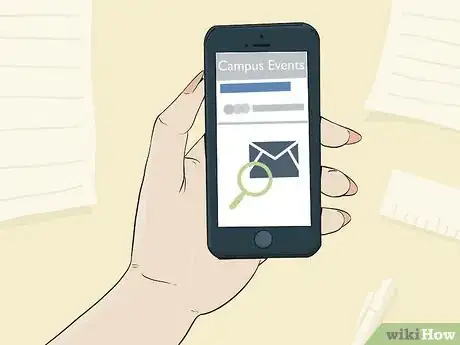This article was co-authored by Liana Georgoulis, PsyD and by wikiHow staff writer, Hunter Rising. Dr. Liana Georgoulis is a Licensed Clinical Psychologist with over 10 years of experience, and is now the Clinical Director at Coast Psychological Services in Los Angeles, California. She received her Doctor of Psychology from Pepperdine University in 2009. Her practice provides cognitive behavioral therapy and other evidence-based therapies for adolescents, adults, and couples.
There are 12 references cited in this article, which can be found at the bottom of the page.
This article has been viewed 19,027 times.
Going to college is such an exciting point in your life and you have the opportunity to make a ton of new friends. Even though everyone might feel like a stranger at first, there are so many opportunities to socialize and connect with your peers. If you’ve ever wondered how you can be a social butterfly on campus, look no further. We’ve put together a list of some of the best ways to meet new people and build relationships no matter where you’re going to school!
Steps
Spend your free time on campus.
-
You’re more likely to meet people in a shared public space. Rather than leaving straight from class and going back to your dorm, stick around on campus for a little while instead. Go to the dining hall to have a meal, pick up something to drink from a cafe, or find a study spot at the student center. Putting yourself out there on campus gives you a lot of opportunities to say hi to new people and potentially meet some new friends.[1] X Research source
- When people walk by, smile and say hi to them. You never know if they want to sit down and have a conversation.
- You could also mention something in your shared surroundings. For example, you could ask for a drink recommendation at the campus cafe.
Go to university events.
-
Your university plans so many fun social events so students can hang out. Check your emails from your university or go on their website to check the event calendar. You may also find events listed on a bulletin board sponsored by student groups and community events. You can usually find events like guest speakers, concerts, or game nights you can attend to meet students that have similar interests as you.[2] X Expert Source

Licensed Psychologist Expert Interview. 6 September 2019. Try to find a few events that you’re interested in so you can schedule them in!- See when your university’s sports teams have games so you can go cheer them on.
- Some universities may also offer off-campus events, such as day trips to a different city.
Join an extracurricular.
-
You’re bound to find a club for people with the same interests as you. Look around your campus for fliers or browse the university website to see what clubs your school has. You’ll find a good mix of academics, student politics, and general interest groups that are available.[3] X Expert Source

Licensed Psychologist Expert Interview. 6 September 2019. Go to one of their scheduled meetings so you can hang out and meet some new people.[4] X Research source- For example, if you’re into writing and publishing, you may try to join the school paper or a creative writing club.
- Stay connected with the club through social media groups or pages.[5] X Research source
- Check your campus calendar to see if they have an involvement fair. Usually around the start of the school year, clubs will set up booths so you can learn more about them and sign up for their email list.
Play an intramural sport.
-
Stay fit and bond with a team if you’re an active person.[6] X Expert Source

Licensed Psychologist Expert Interview. 6 September 2019. If there’s a sport you’ve always wanted to try, see what’s available at your school’s intramural office. Sign up for a team and spend time together when you play your weekly games. You don’t have to be the best player or be super competitive as long as you’re having fun with your team![7] X Research source- Intramurals usually cycle between sports every few weeks so you’ll have multiple options throughout the semester.
Get involved with Greek life.
-
A fraternity or sorority is great for making life-long connections. Fraternities and sororities are groups of your peers that put on a lot of social activities and events on campus. While they usually have a fee to join, you’ll be able to spend time building relationships with the other members, attend formals and themed events, and develop friendships that could last a lifetime.[8] X Research source
- Being in a fraternity or sorority also looks really good on a resume since it shows employers that you're able to follow through with all of the work and services involved in Greek life.[9] X Research source
Find a job on campus.
-
Meet a lot of students while you earn some spending money. Even though working may seem like it cuts into your social life, you can actually get to know a lot of other people while you’re working. See if there are any opportunities on-campus to work so you can interact with other students and work with your peers.[10] X Expert Source

Licensed Psychologist Expert Interview. 6 September 2019. Make a point to talk with everyone you come in contact with to open up and be more personable with your peers.[Image:Improve Your Social Life in College Step 6.jpeg|center]]- For example, if you work in the dining hall, you get to meet everyone who comes through to get food.
- Not every job will allow you to meet other people, like if you’re doing custodial work. Look over the job description to see if there’s potential to socialize.
- Make sure you can balance your work and academics so you can do well at both.
Hang out with your roommate.
-
Try to get along so you can grow closer to them. If you’re assigned someone to live with at the start of the year, take a chance to get to know them.[11] X Research source Schedule some times where you can hang out together in your room to watch a movie, play a video game, or study. Ask them about what they like to do in their free time so you can learn more about them. Hopefully, you can get along so you’re able to meet their friends too.[12] X Research source
- Some universities let you choose your roommate when you move in, so choose someone you’ll get along with if you know someone else at your school.
- Don’t feel pressured to be friends with your roommate if you don’t click very well. There are a lot of other people you can connect with on campus instead.
Talk to your peers in your residence hall.
-
Your shared living spaces are perfect for meeting and hanging out. When you’re in your dorm room, leave your door open to invite other people to pop in. Say hi as you pass them in the halls and let them know what room you’re in so they’re more likely to stop by. If there are common areas, like a kitchen or lounge, spend some time out there so you’re more likely to talk with the other people you live with.[13] X Research source
- Be sure to attend any orientations that your resident advisor sets up since they could do some icebreakers so you can meet the other people on your floor. They may also have meetings and activities throughout the semester, so try to attend each one.
Reach out to students in your class.
-
Build your network with people studying the same subject as you. While you’re in class, keep an eye out for people that you think you’ll get along with based on what they’re wearing, what they mention in class, or just on your intuition. Sit next to the people you’re interested in and introduce yourself when you have a chance. If there’s a group project in your class, see if they want to work together so you can socialize with them even more.
- Show that you’re open and approachable by being attentive in class and actively participating in the discussion.
- Start a study group with a few of your classmates so you can help each other learn the material better and spend time together outside of the classroom.[14] X Research source
Invite people to spend time one-on-one.
-
Plan a fun activity or hangout so you can deepen your friendships.[15] X Expert Source

Licensed Psychologist Expert Interview. 6 September 2019. As you get to know the people you live with and your classmates, see if they want to get together outside of school. Ask if they want to go to a movie, hit up the mall, or hang out at a concert. Since a lot of other people get nervous asking to be friends, taking that first step shows you really want to connect with them.[16] X Trustworthy Source HelpGuide Nonprofit organization dedicated to providing free, evidence-based mental health and wellness resources. Go to source- For example, you could say something like, “Hey Adam, do you want to go grab a coffee after class today?”
Schedule time to socialize.
-
Balance your time to see friends and focus on classwork. Even though you should make time to relax and hang out, make sure you leave enough time for your studies. Slot some time every day to focus on your schoolwork and study so you don’t fall behind in class. When you’re positive that you have enough time to complete all your work, give yourself some extra time to see your friends.[17] X Research source
You Might Also Like














References
- ↑ https://www.umkc.edu/news/posts/2019/may/5-Ways-to-Make-Friends-in-College.html
- ↑ Liana Georgoulis, PsyD. Licensed Psychologist. Expert Interview. 6 September 2019.
- ↑ Liana Georgoulis, PsyD. Licensed Psychologist. Expert Interview. 6 September 2019.
- ↑ https://www.umkc.edu/news/posts/2019/may/5-Ways-to-Make-Friends-in-College.html
- ↑ https://www.northcentralcollege.edu/news/2020/12/14/make-friends-college-during-covid
- ↑ Liana Georgoulis, PsyD. Licensed Psychologist. Expert Interview. 6 September 2019.
- ↑ https://www.apu.edu/articles/arrive-and-thrive-navigating-a-new-college-social-life/
- ↑ https://sc.edu/about/offices_and_divisions/fraternity_and_sorority_life/how-to-join/benefits_responsibilities.php
- ↑ https://www.wpi.edu/sites/default/files/docs/Student-Experiences/Career-Development/CDC_Tipsheets_2016_MarketingGreekLifeOnYourResume.pdf
- ↑ Liana Georgoulis, PsyD. Licensed Psychologist. Expert Interview. 6 September 2019.
- ↑ https://learn.neumann.edu/neudirections/4-ways-to-make-friends-before-arriving-on-campus
- ↑ https://nau.edu/reslife/roommate-success-guide-questionnaire-personal-bio/
- ↑ https://admissions.usf.edu/blog/5-tips-to-meet-new-people-at-college
- ↑ https://www.herzing.edu/blog/how-start-study-group
- ↑ Liana Georgoulis, PsyD. Licensed Psychologist. Expert Interview. 6 September 2019.
- ↑ https://www.helpguide.org/articles/relationships-communication/making-good-friends.htm
- ↑ https://www.teenvogue.com/story/how-to-make-friends-in-college
- ↑ https://www.teenvogue.com/story/how-to-make-friends-in-college
- ↑ https://learn.neumann.edu/neudirections/4-ways-to-make-friends-before-arriving-on-campus
About This Article























































